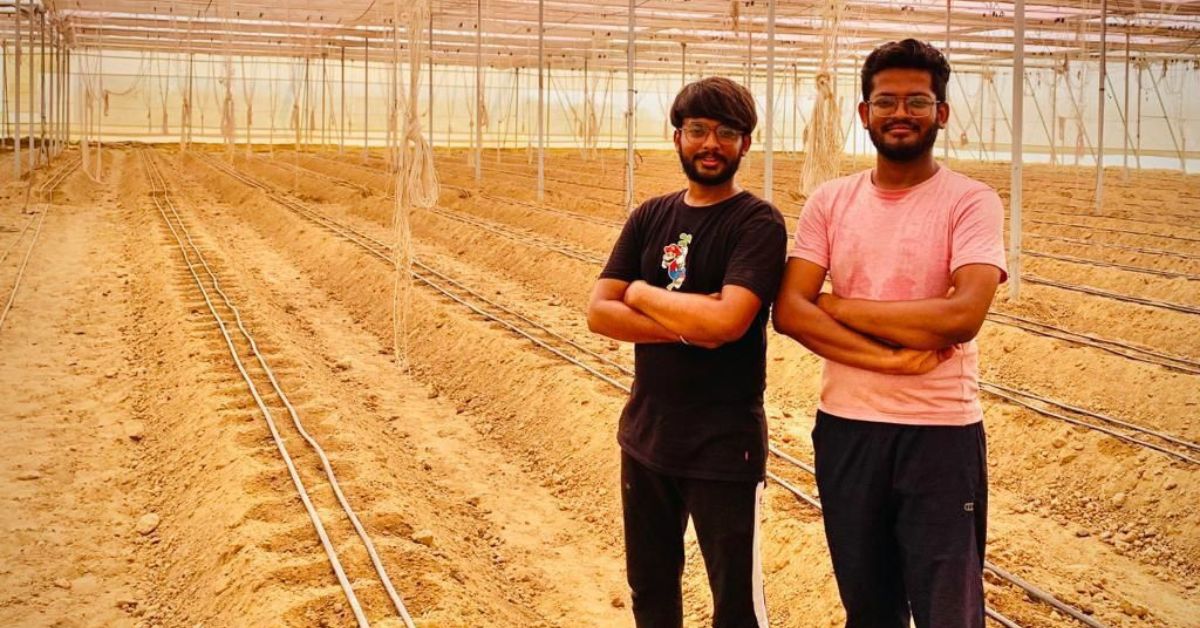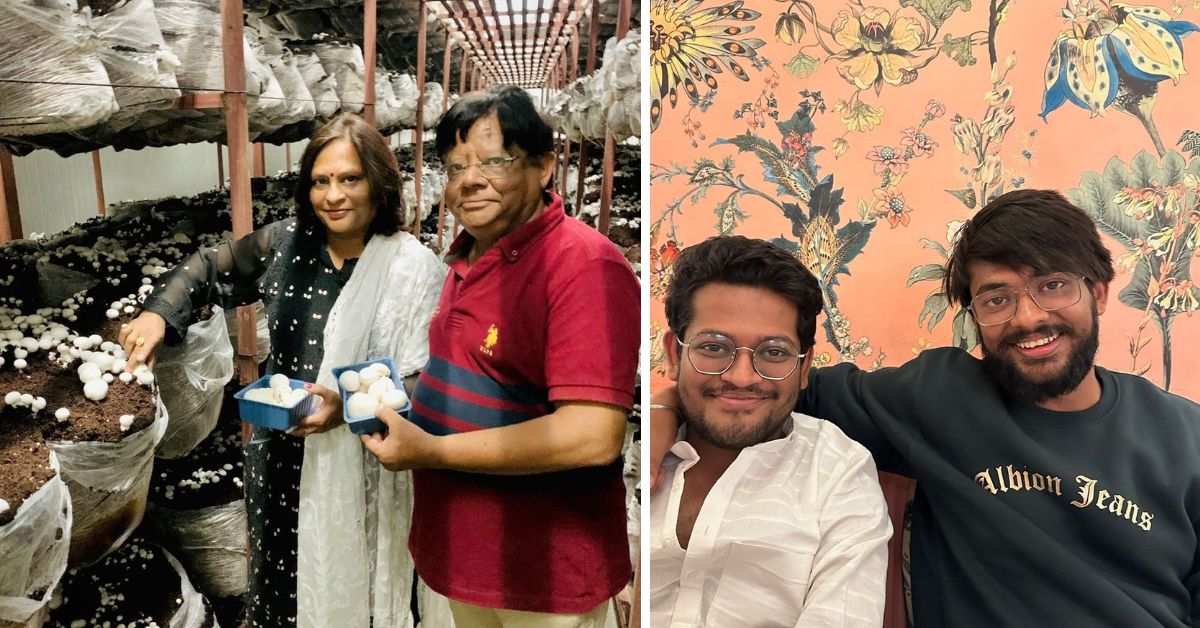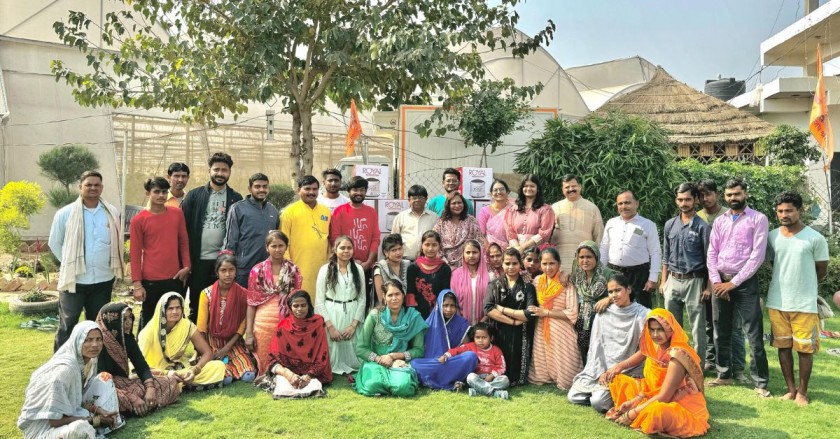When a kid is asked what they want to become when they grow up, the usual answers are either a doctor, pilot, lawyer, or engineer. What is uncommon to hear is that they want to become farmers.
Growing up in cities, away from farms, most children are not even aware of where their food comes from. However, for Rishabh and Ayush Gupta, two brothers from Agra, it was different.
“My father and grandfather were both very interested in agriculture and farming. When we were young, my father even tried his hand at polyhouse farming but was not able to take it through. Since then, my brother and I have been interested in the field,” Ayush says in a conversation with The Better India.
Presently, the duo run an organic polyhouse farm in Agra growing 16 varieties of vegetables and mushrooms. Their business has been soaring with success, selling more than Rs 1 lakh worth of products every day. Their farm produces 40 tonnes of mushrooms and 45 tonnes of vegetables every month!
Intrigued about how they do it? Here is what they have to say:
Making our father’s dreams come true
Originally from Delhi, Ayush (25) and Rishabh (27) grew up watching their father dream of pursuing polyhouse farming. The family moved to Agra in 2014.
Polyhouse farming, also referred to as greenhouse farming or protected cultivation, involves growing crops within a controlled environment. Polyhouses, constructed from transparent materials like polyethene or polycarbonate, permit sunlight penetration while trapping heat inside.
“My father was working and could not dedicate full attention to it. He suggested my grandfather take it up, but he didn’t either. So, he always harboured this wish, and when my brother and I decided to venture into it, we knew where to start,” says Ayush.
It all began when the COVID-19 pandemic hit the country. “Back then, I was in London studying BBA, and my brother was studying in Dubai. We had no intention of coming back home that year, but I had to return due to the lockdown,” he says.

“But my brother was stuck in Dubai due to travel restrictions. It was during that time that he started feeling lonely and wanted to come back home. He realised that he needed to be near his family. So, during our conversations, he made the decision to return to India,” he says.
By the end of 2020, the brothers reunited and decided not to go back to either London or Dubai and instead stay back home.
“We used to always discuss how, if we ever became business persons, we would enter the food industry. However, my father’s passion towards having a farm motivated us to try our hand at that,” he says.
However, the brothers’ decision to become farmers was not well-received by the family.
“It is not uncommon in Indian households for the relatives to have strong opinions. My father was told that he has put so much money into our education and sent us abroad for nothing,” he says.
Disheartened by the reaction, it was his father that gave them the courage. “My father told us that we need not listen to anyone. If this feels right, then we must continue with the idea,” he shares.
With a nod from his parents, the brother duo decided to use some savings and loan some amount to set up the polyhouse farm in Agra.
Organic, natural and fresh
By the end of 2020, the duo had initiated the setup of their farm. “We even secured a 40 percent government subsidy, prompting us to commence with planting English Cucumber in our polyhouse farm,” he says.
Within four months, the duo established their initial cultivation and harvested it within five months. “The cucumber marked just the beginning. We sought further expansion and ventured into experimenting with additional vegetables,” he says.
Almost a decade ago, Ayush recalls, while he was in Delhi, he launched a small mushroom business. “We sourced mushrooms from farmers, packed them, and sold them. Although brief, it made me realise the substantial profit potential of mushrooms.”

Therefore, when Ayush and Rishabh decided to diversify into mushrooms, they anticipated increased profits. “We allocate 1 acre of the farm for other veggies such as cucumber, tomatoes, and potatoes, and 2 acres for mushrooms. We initiated mushroom cultivation in 2022, and our profits have been on the rise since then,” he shares.
Apart from his previous mushroom experience, Ayush also observed a trend in his city. “The region is predominantly inhabited by vegetarians who favour mushrooms. Button mushroom’s popularity has surged over the years. With new recipes circulating online, people are relishing this chewy fungus. I even noticed mushrooms featuring prominently in wedding celebrations, with various dishes showcasing them as the main ingredient.”
Currently, they yield approximately 40 tonnes of mushrooms per month. “They are all A-grade mushrooms, distinguished by their maturity, well-formed shape, and meticulous trimming. Additionally, there are ‘B’ grade mushrooms, which, due to irregular shapes, are sold to food processing companies for canning,” he adds.
Operating under the brand names Gupta Organic Farms and A3R Mushroom Farms, the brothers market their products to businesses and direct consumers. “We supply to numerous businesses in Agra and Delhi, and there’s significant consumer demand in the city. In total, our monthly sales exceed Rs 1 lakh. Our annual turnover stands at Rs 7.5 crores,” he says.
Ayush underscores the brand’s commitment to providing the best to its customers, emphasising that no chemicals are used to aid growth. “All our vegetables and mushrooms are grown organically, without the use of any chemical fertilisers,” he says.

Reflecting on his journey, Ayush says, “I know it is becoming increasingly uncommon for people to look down on a profession like farming. People would comment on how there are better jobs out there, but with the right set of people and motivation, you can make it profitable.”
You can learn more about their products here.
(Edited by Padmashree Bhat; All picture credit: Ayush Gupta)
No comments:
Post a Comment